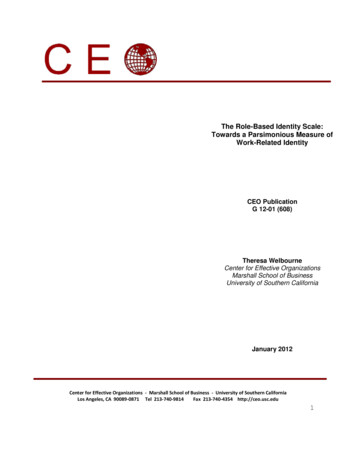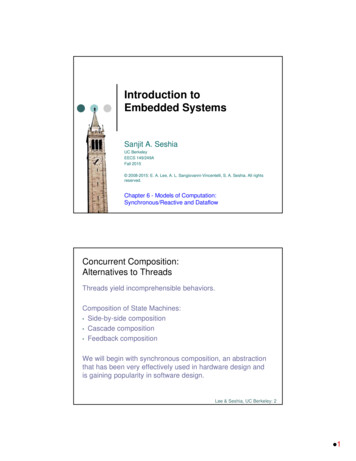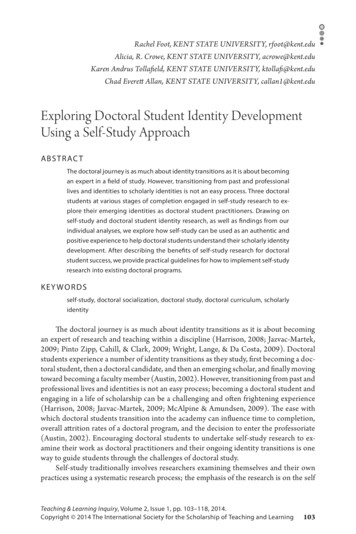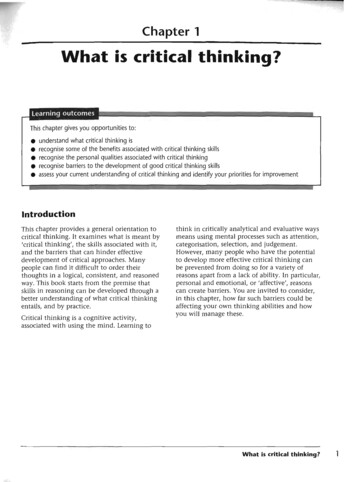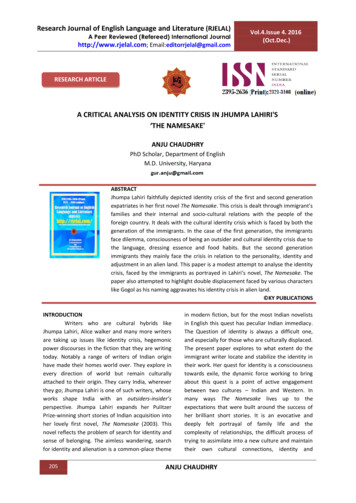
Transcription
Research Journal of English Language and Literature (RJELAL)A Peer Reviewed (Refereed) International Journalhttp://www.rjelal.com; Email:editorrjelal@gmail.comVol.4.Issue 4. 2016(Oct.Dec.)RESEARCH ARTICLEA CRITICAL ANALYSIS ON IDENTITY CRISIS IN JHUMPA LAHIRI'S‘THE NAMESAKE'ANJU CHAUDHRYPhD Scholar, Department of EnglishM.D. University, HaryanaABSTRACTJhumpa Lahiri faithfully depicted identity crisis of the first and second generationexpatriates in her first novel The Namesake. This crisis is dealt through immigrant’sfamilies and their internal and socio-cultural relations with the people of theforeign country. It deals with the cultural identity crisis which is faced by both thegeneration of the immigrants. In the case of the first generation, the immigrantsface dilemma, consciousness of being an outsider and cultural identity crisis due tothe language, dressing essence and food habits. But the second generationimmigrants they mainly face the crisis in relation to the personality, identity andadjustment in an alien land. This paper is a modest attempt to analyse the identitycrisis, faced by the immigrants as portrayed in Lahiri’s novel, The Namesake. Thepaper also attempted to highlight double displacement faced by various characterslike Gogol as his naming aggravates his identity crisis in alien land. KY PUBLICATIONSINTRODUCTIONWriters who are cultural hybrids likeJhumpa Lahiri, Alice walker and many more writersare taking up issues like identity crisis, hegemonicpower discourses in the fiction that they are writingtoday. Notably a range of writers of Indian originhave made their homes world over. They explore inevery direction of world but remain culturallyattached to their origin. They carry India, whereverthey go; Jhumpa Lahiri is one of such writers, whoseworks shape India with an outsiders-insider’sperspective. Jhumpa Lahiri expands her PulitzerPrize-winning short stories of Indian acquisition intoher lovely first novel, The Namesake (2003). Thisnovel reflects the problem of search for identity andsense of belonging. The aimless wandering, searchfor identity and alienation is a common-place theme205in modern fiction, but for the most Indian novelistsin English this quest has peculiar Indian immediacy.The Question of identity is always a difficult one,and especially for those who are culturally displaced.The present paper explores to what extent do theimmigrant writer locate and stabilize the identity intheir work. Her quest for identity is a consciousnesstowards exile, the dynamic force working to bringabout this quest is a point of active engagementbetween two cultures – Indian and Western. Inmany ways The Namesake lives up to theexpectations that were built around the success ofher brilliant short stories. It is an evocative anddeeply felt portrayal of family life and thecomplexity of relationships, the difficult process oftrying to assimilate into a new culture and maintaintheir own cultural connections, identity andANJU CHAUDHRY
Research Journal of English Language and Literature (RJELAL)A Peer Reviewed (Refereed) International Journalhttp://www.rjelal.com; Email:editorrjelal@gmail.combelonging [1]. The paper also explores where theimmigrant writer goes beyond the conventionalwisdom and creates the ‘third space’ where theycreate their identity as transnational. Jhumpa Lahiriemphasises not only the immigrants who leavesomewhere called home to make a new home in theUnited States but also the endless process of comingand goings that create familial, cultural, linguisticand economic ties across national borders. Hercharacters live in between, straddling two worlds,making their identity transnational.The issue of identity crisis is anotherremarkable theme in Lahiri’s narrative. Lahiri findsher identity through her protagonist Gogol wholooks back choose the best of both cultures; of theirhomeland and of their host country. She provides anauthentic picture of diasporic culture by sheddinglights on the lives of characters Ashoke, Ashima andtheir son Gogol; their longings for their origins andcustoms, traditions and views. The novel is a finediscussion on “names, relations ,families,inheritance and cultural assimilation. The novelexposes the eternal quest for identity submergedunder black waters of uprootedness and from thisblack water a new culture reveals the possibility ofblending of two cultures through introspection andself-analysis [10].About identity Jhumpa Lahiri stated in aninterview:The question of identity is always difficultone, but especially so far for those who areculturally displaced, as immigrants are, orthose who grow up in two worldssimultaneously, as is the case for theirchildren. The older I get, the more awaream I that I have somehow inherited a senseof exile from my parents, even though inmany ways I am more American than theyare. In fact it is still very hard for myself tothink as American. For immigrants thechallenges of exile, the loneliness, theconstant sense of alienation, theknowledge and longing for a lost world, aremore explicit and distressing for theirchildren. On the other hand the problemfor children of immigrants, those withstrong ties to their country of origin, is that206Vol.4.Issue 4. 2016(Oct.Dec.)they feel neither one thing nor the other.The feeling that there was no single placewhere I fully belong bothered me growingup. (“A Reader’s Guide for Jhumpa Lahiri’sInterpreter of Maladies”: Houghton MifflinCompany Web Pages) [8].Jhumpa Lahiri characters also bespeak the glory ofcommon life,“I know that my achievement is quiteordinary. I am not the only man to seek hisfortune far from home, and certainly I amnot the first. . . . As ordinary as it allappears, there are times when it is beyondmy imagination.” (Lahiri, IOM 198).Jhumpa Lahiri first novel The Namesake explores thetheme of transnational identity and trauma ofcultural dislocation. Being “an Indian by ancestry,British by birth, American by immigration [2] and herparents having the experience of “the perplexingbicultural universe“ of Calcutta in India and theUnited States, Lahiri mines the immigrantsexperience in a way superior to Bharti Mukherjeeand others” observes Aditya Sinha *3 .In this novel Lahiri’s experiences of growingup as a child of immigrants resemble that of herprotagonist, Gogol Ganguly. Lahiri belongs to thesecond generation of Indian Diaspora whoseongoing quest for identity never seems to end. Theyfeel sandwiched between the country of theirparents and the country of their birth. They are tomaintain ties between the ideologies of these twocountries which are poles apart. But in this processthey are caught between acute identity crisis fromwhere there is nowhere to go. Lahiri finds herselfquite a stranger to both of the countries - in Indiashe is an American and in America she is an Indian[11].The issue of identity crisis in novel TheNamesake occurs to the main character, Gogol, ashe refuses to be called Gogol and identifies himselfwith the name Nikhil (his childhood name) and,later, Nicky (the Americanized version of hischildhood name). The identity crisis in this novel isindeed emphasized in the title, the Namesake.Changing name here is quite important for Gogol inseeking his true identity, since name symbolizes howhe sees himself and how he wants to be seen byANJU CHAUDHRY
Research Journal of English Language and Literature (RJELAL)A Peer Reviewed (Refereed) International Journalhttp://www.rjelal.com; Email:editorrjelal@gmail.comothers. Later, Gogol changes his name to Nikhil,since he feels it reflects his dual identity, both beingIndian and also American, better. Nikhil is indeed aBengali name but it can also be shortened to anAmerican nickname, Nick. Therefore, it is a hybridname in which it will be easier for him to deal betterwith his dual identity.The novel chosen for the study, TheNamesake reflects the dilemmas that Indians facewhen confronted with a foreign culture. In this lightthe novel addresses the issues of culture shock,displacement, rootlessness, sense of unsettling andinbetweeness, conflict in the notion of ‘home’,nostalgia and identity crisis of the immigrants.Jhumpa locates her characters in a settled countryto reflect the changes they undergo, the crosscultural interactions, the discrimination they face,and the difficulty in settling in the new land, in thiscase America. The novel analyses the mindset of thefirst generation and second generation immigrantsand the conflicts that arise out of these. While thethemes of nostalgia, culture shock and unsettlingare addressed through the characters Ashima andAshoke, the themes of identity crisis and culturestereotyping are addressed through the experiencesof Gogol and Moushumi.[4].Jhumpa Lahiri has carried forward herPulitzer Prize winning short stories of Indianacquisition into her first novel. The conditions ofimmigrants in the host country are usually due tocultural misunderstanding and loneliness. Thecultural identity crisis is faced by generations ofimmigrants due to language, food habits, dress codeand personal identity. In Gogol’s case it is due to hisname. The feeling of nostalgia, loneliness andhomelessness is also divided systematically. InAshima’s case it is due to migration. Gogol andMoushmi face it due to cultural hybridity. Ashokeand Ghosh are permanently dislocated from theworld. They leave all homes behind and reach theother world [5].The Namesake is a novel about the searchfor an identity set in the backdrop of Kolkata and theUS. In a lifetime, we comes across several identities:an identity we are born into , by default, at birth;identities forged from a scratch in foreign lands andidentity that we want for ourselves. And when so207Vol.4.Issue 4. 2016(Oct.Dec.)many choices are offered to us, defining who wereally are becomes a crisis in itself. Caught in such aweb of identity crisis is Ashoke Ganguli’s son, Gogol,named in haste after Ashoke’s favourite authorNikolai Gogol.In The Namesake, for Gogol, family is not aloss to be mourned, but rather a burden, aninescapable and often unwanted presence. As asecond-generation immigrant, Gogol indirectlyinherits his immigrant parents’ sense of loss as wellas the weight of their fumbling attempts to survivein a foreign culture. This simultaneous loss andburden is manifested in an extended identity crisisas he experiences life through the role of atranslator trying to negotiate between two culturesand sets of expectations.Gogol continues to struggle with his nameand identity as he ages, and ironically he ends uplonging for the very dual identity that he rejected asa child. Although “the peculiarity of his namebecomes apparent” (Lahiri 68) to Gogol when he iseleven years old, he does not mind thedistinctiveness of his name. Not surprisingly, it isduring the onset of adolescence that Gogolconsciously acknowledges feelings of alienation,shame, and self-loathing, feelings that suggestanother identity crisis. When his father gives him acopy of The Short Stories of Nikolai Gogol for hisfourteenth birthday, he acts politely indifferent.Inside, however, feelings of resentment comeboiling to the surface[6]:For by now, he’s come to hate questionspertaining to his name, hates havingconstantly to explain. He hates having totell people that it doesn’t mean anything“in Indian” . . . He hates that his name isboth absurd and obscure, that it hasnothing to do with who he is, that it isneither Indian nor American but of all thingsRussian. (The Name sake 76, emphasisadded)The importance of namesake and identity is broughtup throughout the story and becomes a conceptthat is central to the novel .Through his Life Gogolsuffers from the uniqueness of his name. In BengalifamiliesANJU CHAUDHRY
Research Journal of English Language and Literature (RJELAL)A Peer Reviewed (Refereed) International Journalhttp://www.rjelal.com; Email:editorrjelal@gmail.com‟‟ .individualnamesaresacred,inviolable. They are not meant forinheritanceandshared”(TheNamesake,28).Gogol is traumatized because he takes his Russianname for his identity. Gogol, the protagonist of thenovel The Namesake is given a name which he findsmisfit on his personality, somehow disgusting,meaningless and shapeless. In the course ofchanging his name he loses his identity. As Gogolgrows up in an American culture he realized that hisidentity is an imposed one. He thinks that Russianname has nothing India about it, he finds it verysuffocating that his name is neither American norIndian, mere irrelevant, ludicrous, lacking, dignityand gravity. When he turns fourteen, this identitycrisis becomes apparent. His situation becomespathetic because he knows that it was he, who lethis pet name turned out to be his good name in theKindergarten, otherwise his parents have registeredhim under the name “Nikhil”, but he did notrespond to that name because at that time his earwas not habituated to that name. Now, he feels veryhelpless that,He could have been Gogol only 50 percentof time He could have had alternative identity, a Bside to the Self (The Namesake,76).The identity crisis also occurs to Ashoke and Ashima.Tracing back the tradition in Indian immigrant likeAshoke and Ashima, accordingly, feel displaced andlose their identity as well India, the people aredivided into different castes. The system of caste,which previously only occurs to India-Hindu society,later happens to the whole India since the era ofBritish colonialization. Though it seems to limit theirway of life, the system of caste mostly tells peoplewhat to do and how to behave according to in whatcaste they belong to. When they become immigrantand live outside their homeland, they surely have noidea about themselves[9].Through Gogol, Lahiri presents identitycrisis which she herself has faced acutely. She isobsessed with everything that matters in a name.Name signifies the first identity. But this identitygets a setback when it comes to the secondgeneration of Indian Diaspora.208Vol.4.Issue 4. 2016(Oct.Dec.)Moushmi as a character is also caught up in a crosscultural web. She takes pride in being consideredFrench or half French. In an attempt to resolve heridentity crisis, she finds herself getting intonumerous sexual escapades with many men in Paris.She finds herself shunning the ‘forced’ Indianidentity and the ‘given’ American identity andadopting a totally new identity of being French.Sonali on the other hand portrays a more balancedapproach to life. She exhibits a composite identitywhich is both Bengali and American by wanting tomarry a white American according to Bengalicustoms and traditions. Sonali has an inclusiveapproach in taking care of both the traditions.ConclusionTo sum up, identity is indeed a matter ofchoice, though choosing the right one will be quitedifficult for those who are at total lost. TheNamesake by Jhumpa Lahiri, which hopefully willhelp the understanding the case of identity crisisoccurs to diaspora people. Gogol feels identity crisisat the beginning of the novel and reaches at theconclusion that there is no escape from action andidentity and action is better than inaction. He triesto find his roots, his identity and finally learns thelesson of action preached by existential philosophy.He realizes that the only way for an immigrant to getrid of identity clashes is to accept that dual, fragileand hyphenated identity. Much of the part of thenovel centers on the Gogol’s name that is the mostbasic part of an individual’s identity. This name itselfbecomes the main cause of identity crisis faced byGogol. This identity crisis also affects Gogol’s familyrelationship and his social relation with his peers.The identity of the individual, which is consistentlyaffected by society, is something one has to discoverthrough a process of reflections and negotiations.Her works are overtly about immigrants, culturalclashes, assimilation and adaptation and so forth.They disclose how the socio-cultural forces,ethnicity, and genders have influenced theexpatriate characters and bring out anxieties,uneasiness, nostalgia, rootlessness and alienation,disconnection in relationship and identity crisis thatthey have to come to terms with. Finally this paperconcludes ‘identity’ is an important factor of post-ANJU CHAUDHRY
Research Journal of English Language and Literature (RJELAL)A Peer Reviewed (Refereed) International Journalhttp://www.rjelal.com; Email:editorrjelal@gmail.comcolonial expatriate literature and Lahiri’s stories dealwith identity crisis and identity losses.BibliographyPrimary SourcesLahiri, Jhumpa. The Namesake. New Delhi: HarperCollins Publishers India, 2003Secondary Sources[1]. Ms Yogita Sahni. “Sense of Belonging inJhumpa Lahiri’The Namesake” IOSR JournalOf Humanities And Social Science. Volume 19,Issue 1, Ver. XII (Feb. 2014), PP 13-19[2]. Nayak,Bhagabat,“MulticulturalCommitment: A Study of Jhumpa Lahiri’sInterpreter of Maladies”. Atlantic Publisher,New delhi-2002.p.26[3]. Aditya Sinha “Review of ‘The Namesake’ . TheMalady of Naming” in Hindustan Times,September 28,2003[4]. Dr. Swathi Chikkala et al. "The GreatestJourneys are the ones that bring you home"International Journal of Academic Research .Vol.1 Issue-3(1), October-December, 2014,211-233[5]. S.NoyingbeniYanthan.DiasporicConsciousness: A Study Of Jhumpa Lahiri’sThe Namesake. The Achievers [6]. Laura Traister, Immigration and �s Jasmine and Jhumpa Lahiri’s TheNamesake as Translators and TranslatedBeings. East Tennessee State Universtiy.May2016. Undergraduate Honors Theses[7]. Dr. Aeda Abidi. , Jhumpa Lahiri’s TheNamesake — Negotiating Identity ional Refereed Journal of EnglishLanguage&Literature,ISSUEII:Marginalisation July-August, 2014.page 66[8]. umpa-lahiris-fiction/[9]. Fadhila Eka Ratnasari. “Displacement &Diaspora: Case of Cultural Identity found in209Vol.4.Issue 4. 2016(Oct.Dec.)Jhumpa Lahiri’s The Namesake & Leila emia.edu/8104264/Displacement and Diaspora Case of Cultural Identity found in Jhumpa Lahiri s The Namesake and Leila S. Chudori s Pulang[10]. Dr. Neelu Shrivastava. "The Diaspora PsycheIn Jhumpa Lahiri’s “The Namesake” ResearchScholar Vol. 3 Issue I, February, 2015 135-138[11]. Anita Sharma, “Identity Crisis in JhumpaLahiri’s The Namesake”, Language in India,13:6 June 2013, 120-124ANJU CHAUDHRY
they go; Jhumpa Lahiri is one of such writers, whose works shape India with an outsiders-insider’s perspective. Jhumpa Lahiri expands her Pulitzer Prize-winning short stories of Indian acquisition into her lovely first novel, The Namesake (2003). This novel reflects t


